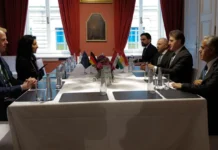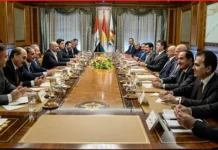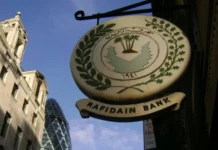Tishwash: Foreign Minister arrives in New York
Deputy Prime Minister and Minister of Foreign Affairs Fuad Hussein arrived in New York to participate in an international conference on the future of the Palestinian cause.
A statement by the Ministry of Foreign Affairs received by the Iraqi News Agency (INA) stated that “Deputy Prime Minister and Minister of Foreign Affairs Fuad Hussein arrived in New York City to participate in a special international conference to discuss the future of the Palestinian cause and related developments on the regional and international arenas.”
The conference, according to the statement, comes amid escalating challenges facing the Palestinian people.
During his visit, the minister is scheduled to hold a number of meetings with his counterparts, foreign ministers and international officials, to coordinate joint action in support of the Palestinian cause and strengthen the common Arab and Islamic position within the United Nations. link
Tishwash: Atwan al-Atwani Elected New Governor of Baghdad Following Council Vote
Two candidates were vying for the post: al-Atwani, head of the Iraqi parliament’s finance committee, and Haider Mohan.
Atwan al-Atwani was elected as the new governor of Baghdad on Sunday.
On the same day, Baghdad’s provincial council convened to vote on the election of a new governor.
Two candidates were vying for the post: al-Atwani, head of the Iraqi parliament’s finance committee, and Haider Mohan.
Iraqi President Abdul Latif Rashid stated on Saturday that Baghdad Governor Abdul Muttalib al-Alawi would retire and that a new governor needed to be appointed as soon as possible.
This marks the second time the governor of Baghdad has sought retirement; he previously applied on July 3 and was temporarily replaced by Mohan. link
************
Tishwash: Kurdistan is transforming into a new Iraq
It’s no surprise, with the Kurdistan Region of Iraq’s employee salary crisis looming, that we hear numerous Iraqi Arab voices, from Arabs in Kurdistan and the central and southern parts of the country, calling on the government of Mohammed Shia al-Sudani via social media to end the crisis and pay the salaries of the region’s employees.
It’s no surprise to see, among these voices, those criticizing the federal government for its delay in addressing the crisis and sympathizing with the people of the region. They even sometimes remind Baghdad of the urban achievements, development, and prosperity achieved in the governorates of Erbil, Sulaymaniyah, Dohuk, and even Halabja, compared to what has been achieved to date in other Iraqi governorates.
This is despite the fact that the region’s budget is not even equivalent to the budget of a federal ministry such as the Ministry of Education! This praise has been documented in comparative terms, and visual facts about the conditions of Iraqi cities in terms of basic services have been published.
It’s true that everyone is aware of rampant corruption in the Kurdistan Region, which is criticized daily by local media and even acknowledged by some influential officials. However, there are also reconstruction and service development projects, albeit limited compared to previous phases.
The gist is that Iraq today is witnessing the gradual birth of a different citizenry, a conscious being whose eyes are fixed on the country as a whole, comparing people’s conditions with the logic of the state and the ruling class’s commitment to managing the country’s affairs in a way that satisfies citizens and achieves their minimum aspirations, even if corruption persists and oversight institutions fail to curb it.
Corrupt accountability
The starting point here is that the Kurdistan Regional Government, despite receiving only 12 percent of the general budget, has become a unique model in Iraq in terms of urban development, the provision of safe drinking water, the continuity of national electricity, the paving of streets, the construction of bridges, the opening of universities and hospitals, the development of villages, the establishment of summer resorts and parks, the paving of roads, and so on.
This development and prosperity are achieved despite persistent corruption and despite citizens’ occasional widespread demonstrations and protests demanding services, the timely payment of salaries, and the accountability of corrupt officials. Criticism of the general situation is also increasing from opposition forces and the free media in the region, expressing their desire for further progress, given the region’s wealth and resources, which would ensure the well-being of any citizen if distributed fairly and free from corruption, favoritism, and theft.
In other words, the Iraqi Arab citizen’s comparison of the reality of the central and southern governorates with the reality of the northern governorates reflects a new awareness of a citizen striving for a better life and wishing to remain in a geographical area where they feel safe, prosperous, and where the state is present, with a minimum sense of responsibility, so that they are not forced to emigrate and leave their homeland. Today, this citizen is the one who chooses to live in Iraqi Kurdistan, residing among his family and compatriots, working or investing. Therefore, it is not surprising that he praises what the rest of the country lacks.
Another fact, which is not often mentioned, is that the number of Iraqi Arabs residing in Kurdistan today is approaching one million people! While some of them moved to the region for security reasons, this same group now prefers to remain there even if the security situation stabilizes in the areas they left. The other group chose to reside in Kurdistan voluntarily, not only in search of safety, but also because they feel there is an entity serving its citizens.
Today, this new Iraqi citizen is also contributing to the birth of a different Kurdistan, one that has become a different Iraq where everyone coexists in peace and harmony: Kurds and Arabs, Sunnis and Shiites, Christians and Turkmen, and all other sects and denominations. This alone is enough to bestow an authentic Iraqi character on Kurdistan, a character perhaps superior and better than that of the rest of the country, where coexistence, tolerance, and the building of a spirit of citizenship prevail. link





